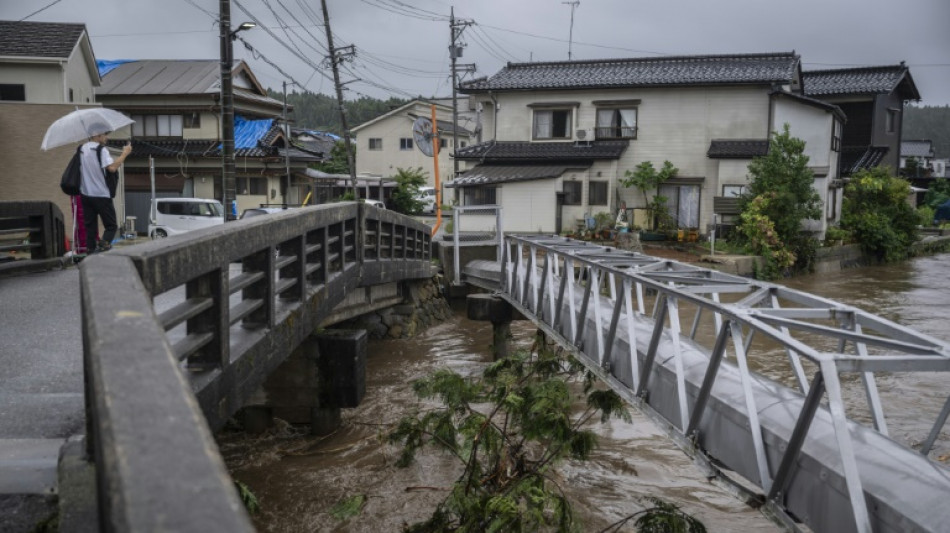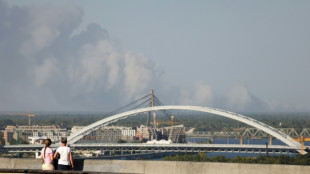

Floods, landslides hit central Japan months after major quake
Heavy rain lashed central Japan on Sunday, with floods and landslides leaving one dead and at least six missing in an area already devastated by a major earthquake earlier this year.
Muddy rivers ran high in Anamizu, a city on the Noto Peninsula, where damage from the January quake that killed at least 318 people is still visible, AFP reporters said.
Authorities on Saturday had urged tens of thousands to evacuate, calling the rains "unprecedented" as the weather agency issued an emergency warning for the area that remained in place on Sunday.
Landslides blocked roads and widespread flooding affected homes -- including eight temporary housing complexes in Wajima and Suzu where victims of the magnitude-7.5 earthquake on January 1 are residing.
Military personnel have been sent to the Ishikawa region on the Sea of Japan coast to join rescue workers, top government spokesman Yoshimasa Hayashi told reporters on Saturday.
Some 6,000 households were without power and an unknown number were without running water, the Ishikawa regional government said.
In Anamizu, more rain fell Sunday onto quake-damaged houses and the shattered stone columns of a shrine still lying on the ground months after they were toppled.
A message blared from the city's loudspeaker disaster prevention system warning residents that the rain could flood the sewer system and dirty water could rise up.
Hideaki Sato, 74, stood on a bridge holding a small blue umbrella, anxiously looking at the swollen water of a small canal.
"My house was flattened completely in the quake," he told AFP.
"I now live in a small apartment room right there," he said, pointing at a wooden structure behind him. "If this floods, it would be a real problem."
- 'Secure your safety' -
Prime Minister Fumio Kishida has instructed the government "to do its best in disaster management, with saving people's lives as the first priority", according to Hayashi.
Scientists say human-driven climate change is intensifying the risk posed by heavy rains because a warmer atmosphere holds more water.
The areas under the emergency warning saw "heavy rain of unprecedented levels", JMA forecaster Satoshi Sugimoto told reporters Saturday, adding "it is a situation in which you have to secure your safety immediately".
More than 120 millimetres (4.7 inches) of rainfall per hour were recorded in the city of Wajima on Saturday morning -- the heaviest rain since comparable data became available in 1929.
Footage on public broadcaster NHK showed an entire street submerged in Wajima, one of the areas hardest hit by the huge New Year's Day quake, which toppled buildings, ripped up roads and sparked a major fire.
As of Sunday morning, one person had been killed, three were missing and two were seriously injured in Ishikawa, the fire and disaster management agency said.
At least a dozen rivers burst their banks and two of the missing were reportedly carried away by strong currents.
Another three people were missing who had been working for the land ministry to restore a road in Wajima, local ministry official Yoshiyuki Tokuhashi told AFP.
One worker who had been reported missing "walked to the tunnel" near the landslide where 26 others were taking shelter, Tokuhashi said, adding that all 27 workers had now been evacuated to safety.
"Rescue work was planned to start at 5 am this morning, then it was suspended due to heavy rain, but is scheduled to resume at around 11 am," he said.
Municipalities in Ishikawa told 75,000 residents in the region -- including in the cities of Wajima and Suzu, as well as Noto town -- to evacuate, officials said.
Another 16,800 residents in Niigata and Yamagata prefectures north of Ishikawa were also told to evacuate, the fire and disaster management agency said.
A.Lewis--MC-UK




